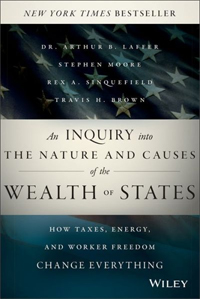 John Hood’s latest article for the print edition of National Review critiques the methodology used in the new book An Inquiry into the Nature and Causes of the Wealth of States. While sympathetic with the book’s aim, Hood takes issue with its central premise — “the proposition that state income taxes are an original sin that must be expurgated.”
John Hood’s latest article for the print edition of National Review critiques the methodology used in the new book An Inquiry into the Nature and Causes of the Wealth of States. While sympathetic with the book’s aim, Hood takes issue with its central premise — “the proposition that state income taxes are an original sin that must be expurgated.”
I share the authors’ view that governments ought to tax consumption, not total income. But to insist that state politicians accomplish this by abolishing income taxes in favor of broadened sales taxes is to set them up to fail. No state has pulled this off (the only state to ditch its income tax, Alaska, has a tiny population and gargantuan oil revenues). Attempts to broaden retail-sales taxes to professions such as doctors, lawyers, and bankers almost always fail. Even attempts to tax less powerful service providers usually fail, because small-business owners call their legislators and scream bloody murder. Meanwhile, those legislators face damaging attacks by the Left for seeking to raise taxes disproportionately on the poor to fund tax cuts disproportionately for the wealthy.
A better approach would be to zero in on the main reason that income taxes are destructive — their effect on savings and investment. Income equals consumption plus savings (plus a sliver of gift-giving). Consider (1) a properly structured flat-rate sales tax that applies to all goods and services sold at retail and (2) a properly structured flat-rate income tax that exempts either the principal or the return on savings. Both would tax essentially the same base over time: total consumption. States can move gradually but steadily toward taxing consumption within an income-tax framework by consolidating multiple rates, reducing the double taxation of dividends and capital gains, and expanding tax-free savings accounts. This would allow state politicians to address regressivity concerns directly by adjusting personal exemptions or per-child tax credits (which act as a write-off for family investment in the future taxable income of children, by the way).
I’m critical not because I disagree with the book’s goals but because I think a more rigorous approach would have advanced them further. Gleeful as they may be in attacking Laffer’s methodology, liberals truly are woefully misinformed about these issues. High state-tax burdens do harm economic growth. So do heavy regulatory burdens. …
… What conservatives should be arguing is not that tax reform will produce more net revenue to spend on government, as The Wealth of States unwisely asserts (by using the wrong metric), but that government spends too much already, getting a poor rate of return. States should spend less, which will allow them to tax less (and less foolishly), which will then create more jobs and higher incomes.

